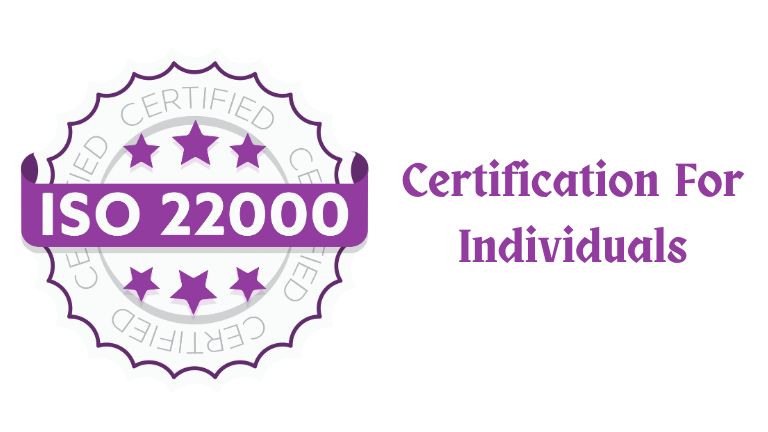In an era where food safety has become a global concern, having specialized knowledge and certification in food safety management can be a game-changer for individuals. ISO 22000 certification, specifically designed for food safety management systems (FSMS), is not just for organizations but also highly valuable for individuals who wish to build or advance their careers in food-related industries.
This article explores the significance of ISO 22000 certification for individuals, its benefits, the certification process, and how it can boost professional opportunities.
Understanding ISO 22000 Certification
ISO 22000 is an internationally recognized standard developed by the International Organization for Standardization (ISO). It focuses on ensuring food safety throughout the food supply chain by identifying, preventing, and mitigating food safety risks.
While ISO 22000 certification is often associated with organizations, individuals can also pursue specialized training and certification to gain in-depth knowledge of food safety management principles. This certification equips individuals with the skills to understand and implement food safety protocols, making them valuable assets in industries such as food manufacturing, hospitality, retail, and healthcare.
Who Should Consider ISO 22000 Certification?
ISO 22000 certification is ideal for professionals in food-related sectors, including:
- Quality Assurance Managers: To ensure food safety practices are consistently implemented.
- Food Safety Auditors: To conduct audits in compliance with ISO 22000 standards.
- Production Managers: To oversee safe manufacturing processes.
- Hospitality Professionals: To manage food safety in hotels and restaurants.
- Consultants: To guide businesses in implementing FSMS.
- Healthcare Professionals: To maintain high food safety standards in medical facilities.
Students and aspiring professionals aiming to enter the food industry can also benefit immensely from this certification, as it gives them a competitive edge in the job market.
Key Benefits of ISO 22000 Certification for Individuals
1. Enhanced Knowledge and Skills
The training program for ISO 22000 certification covers essential concepts such as Hazard Analysis and Critical Control Points (HACCP), risk management, and the principles of food safety management systems. This knowledge enhances an individual’s competency in managing food safety risks effectively. 2. Improved Career Prospects
Employers in the food industry highly value professionals with ISO 22000 certification. It demonstrates your expertise in food safety management and sets you apart from other candidates. Certified individuals are often considered for leadership roles and higher salaries.
3. Global Recognition
ISO 22000 certification is recognized worldwide, making it an excellent qualification for professionals aspiring to work in multinational companies or abroad.
4. Contribution to Public Health
By implementing the principles of ISO 22000, individuals contribute to reducing foodborne illnesses and ensuring the safety of consumers. This sense of responsibility and impact is personally fulfilling.
5. Compliance Expertise
Certified individuals understand global food safety regulations and standards, enabling them to help organizations comply with legal requirements and avoid penalties.
Steps to Achieve ISO 22000 Certification
Becoming ISO 22000 certified involves a structured process:
1. Choose a Certification Course
Look for a reputable training provider or institute offering ISO 22000 certification courses. Ensure that the course is accredited and aligns with international standards.
2. Understand the Course Content
Typical course modules include:
- Introduction to ISO 22000 and its benefits
- FSMS principles
- Risk analysis and HACCP
- Implementation of food safety controls
- Internal auditing and continual improvement processes
Courses may be available in different formats, such as classroom-based, online, or hybrid, offering flexibility for working professionals.
3. Attend Training Sessions
Participate in the training sessions to understand the theoretical and practical aspects of ISO 22000. Interactive sessions often include case studies, role plays, and hands-on exercises.
4. Pass the Certification Exam
Most programs conclude with an exam to test your understanding of the ISO 22000 standards and their application. Passing this exam is mandatory to receive your certification.
5. Apply Your Skills
Once certified, you can apply your skills to real-world scenarios, helping organizations implement or improve their FSMS.
Career Opportunities with ISO 22000 Certification
1. Food Safety Auditor
Certified individuals can work as internal or external auditors, assessing food safety systems for compliance with ISO 22000.
2. Quality Assurance Specialist
In this role, you’ll oversee quality control processes, ensuring that food products meet safety standards.
3. Food Safety Trainer
Use your certification to educate others about food safety management, either within organizations or as an independent consultant.
4. HACCP Consultant
Specialize in helping businesses design and implement HACCP plans, which are integral to ISO 22000.
5. Regulatory Compliance Officer
Work with organizations to ensure they adhere to local and international food safety laws and regulations.
Challenges and Solutions
While ISO 22000 certification offers numerous benefits, individuals may face challenges such as:
Time Constraints
Balancing certification training with professional or personal commitments can be difficult. Opt for flexible online courses to overcome this.
Financial Investment
The cost of certification can be a concern for some individuals. Look for affordable training programs or consider employer-sponsored options.
Practical Application
Understanding theoretical concepts is one thing, but applying them in real-world scenarios can be challenging. Choose programs that include hands-on training or internships for practical experience.


